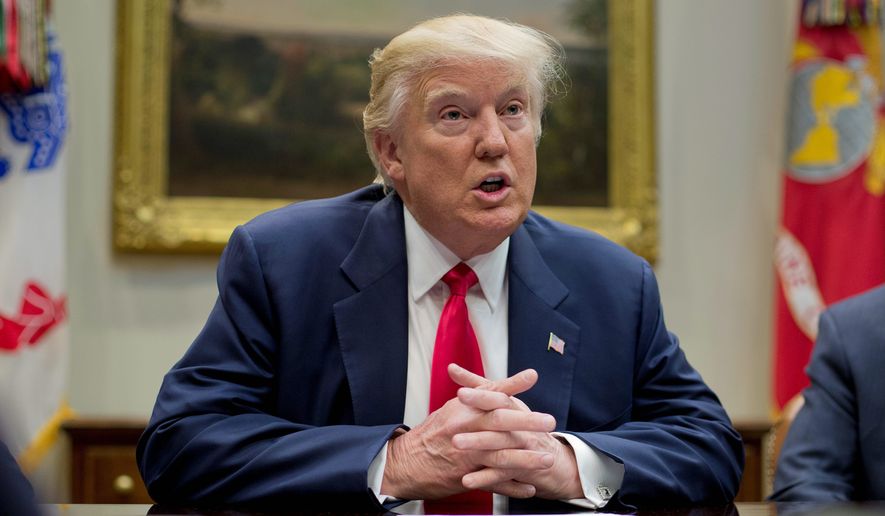President Trump campaigned on his reputation as a successful businessman, promising voters he would run the government like one of his enterprises. But his management of the executive branch since taking office has been plagued by difficulties marshaling White House staff and problems with rollouts of his extreme vetting policy and his federal hiring freeze.
The president has repeatedly pushed back against often-speculative reports of a White House in chaos.
“Don’t let the FAKE NEWS tell you that there is big infighting in the Trump Admin. We are getting along great, and getting major things done!” he tweeted after news reports alleged an Oval Office dustup based on fleeting video footage CNN shot through a window.
However, hiccups in major policy initiatives and the perception that Mr. Trump is out of the loop, such as when Attorney General Jeff Sessions unexpectedly recused himself from the Justice Department’s investigation of Russian meddling in the election, belie the take-charge persona that the president portrayed on the stump.
Other times, Mr. Trump has appeared slow to act.
He took 17 days to fire retired Army Lt. Gen. Michael Flynn as national security adviser after learning he had misled the vice president and other White House officials about discussions during the transition with the Russian ambassador to the U.S.
The management missteps have been most alarming to the president’s supporters.
“It starts at the top, and it goes downhill,” Ken Crow, a founder of the tea party movement and an early supporter of Mr. Trump, said of the administration’s early stumbles.
Mr. Crow noted the leaks from the U.S. intelligence community that have dogged the Trump administration. After calling the leaks a national security threat, the president turned to Congress to investigate — even though the intelligence agencies report to the White House, and Mr. Trump, as commander in chief, has full authority to unleash his own probe or clean house as he sees fit.
“There’s rats in the wood pile. They need to flush them out and get rid of them. I would think that somebody with his management expertise would have already put somebody on that,” Mr. Crow said.
He stressed that, despite his dismay over management issues, he was pleased with many of the actions Mr. Trump had undertaken in a little more than a month in office.
The misfires involved some of Mr. Trump’s most ambitious policy moves and top campaign promises.
The executive order Jan. 27 that temporarily banned visitors from targeted countries and refugees caught travelers, airports and some federal agencies by surprise. The ensuing confusion, which helped fuel court challenges that ultimately blocked the program, can be traced back to the White House.
Even the courtroom defense of the extreme vetting order proved lacking. The administration’s lawyers, when asked by judges, failed to cite the dozens of foreign visitors and refugees connected to terror plots since 9/11.
Nearly a month after a federal appeals court upheld the stay on the “extreme vetting” program, Mr. Trump signed a new executive order Monday that addressed the problems from the original rollout as it attempted to answer concerns raised by the courts.
The federal hiring freeze Mr. Trump imposed shortly after taking office made good on his campaign promise to rein in spending and shrink the government workforce. But the speedy implementation left agencies, including the Pentagon, wondering how to follow the rules.
Despite an exemption for day care workers on military bases, two Army bases erroneously informed parents that day care was being cut.
The freeze also caused civilian staffing shortages that impacted military readiness, as soldiers had to be reassigned to run gun ranges or stand guard at front gates.
“From my foxhole, all things readiness, going-to-war capabilities, from force protection to training to running ranges, that has been the impact,” Army Lt. Gen. Joseph Anderson told a House panel this week. “It has required more borrowed military manpower to compensate on installations, to run those types of facilities, which are the same soldiers which should actually be going through the training.”
The difficulties stem from the president’s attempt at “grand gestures” rather than policy details in his first days in office, said Kevin Kosar, a senior fellow at the R Street Institute, a nonpartisan think tank that promotes free markets and limited government.
Still, he credited Mr. Trump with taking on the Washington establishment and attempting to remake the federal government.
“Certainly, he has been disruptive. He’s challenging some long-held assumptions and habits and practices,” Mr. Kosar said. “But anybody who has run a business of any size will be able to tell you that running a business well means paying attention to details and getting the small things right.”
He said that attention to detail, the type of management that enables Amazon to quickly and reliably deliver almost anything to your doorstep, has not been the hallmark of the Trump administration.
“It’s a steep learning curve,” Mr. Kosar said. “You come in with fresh ideas and, not surprisingly, they go over like lead balloons.”
• S.A. Miller can be reached at smiller@washingtontimes.com.




Please read our comment policy before commenting.